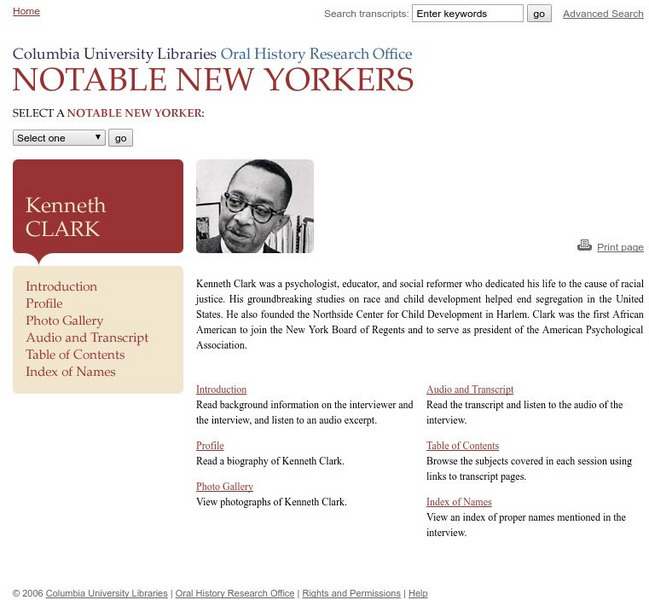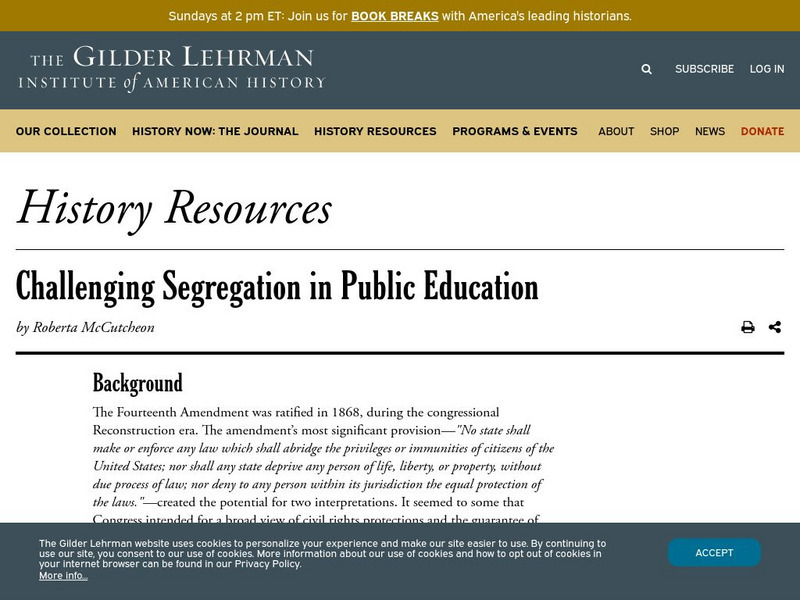Curated OER
Integration of Education
Students explore the history of Civil Rights and how the struggle for Civil Rights and the Second Reconstruction, transformed society and politics in the United States in the 1950s. Then they identify why American Schools are integrated...
Curated OER
Segregation in Prince Edward County
Eleventh graders examine the history of integration as it applied to Virginia high school in Prince Edward County. They evaluate a map of Virginia counties, read and analyze a first person narrative of a young girl involved in a boycott...
Curated OER
Brown v. Board of Education of Topeka (Kansas) (Grades K-3)
Students examine the Brown v. Board of Education case in Topeka, Kansas. They re-enact the courtroom and discuss how school would be different today if this case never existed. They discuss how public education has been affected by this...
Curated OER
The Battleground: Separate and Unequal Education
Students examine the purpose and goals of education in African American society. They analyze photos, answer discussion questions, and participate in a class discussion.
Curated OER
What Effect Does A Communities Attitudes/Values/And Beliefs Effect Student Behavior And Influence Curriculum
Learners examine how race relations effect the kinds and amount of educational resources individual schools receive within a school district.
Curated OER
Schools of Thought on Segregation
Students read a New York Times article in order to explain how American courts and communities are dealing with the unanimous Supreme Court decision to end "separate but equal" education. They analyze how this affects the nation's youth.
Curated OER
Martin Luther King Jr. Who Is He?
Pupils describe MLk's leadership of the desegregation movement. Students discuss the meaning of non-violent revolution. Pupils identify the difference between their lives and those ofcitizens in 1963. Students write a short essay about...
Curated OER
John's Dilemma
Students read and discuss the story "John's Dilemma". As a class, they answer discussion questions related to peer pressure and responsibility. They compare a quote by Anne Frank to the situation John is going through in the story to...
Curated OER
50th Anniversary of Brown v. Board of Education
Students examine the Brown v. Board of Education case that ended segregation. They role play to re-enact the case and discuss why it was important. They discover its impact on public education.
Curated OER
From Slavery to Segregation
Students study the causes and effects of slavery and segregation. They write an essay (including either pictures, charts, graphs or copies of documents to support their essay) which addresses the African American's journey from slavery...
Curated OER
Crisis in the Classroom: Little Rock & Boston
Students examine periods and instances of racial disharmony in the aftermath of segregation in the South, and de facto segregation in the North. They analyze causes of antagonism between racial groups and explore possible solutions.
Columbia University
Columbia University Libraries: Notable New Yorkers: Mamie Clark
On this website you can read about Dr. Mamie Clark, distinguished African-American educator, and hear an interview with her about her studies of race and child development. This interview is part of Columbia University's Oral History...
Columbia University
Columbia University Libraries: Notable New Yorkers: Kenneth Clark
Read about Kenneth Clark, an influential black educator and psychologist. You can also listen to the interview on which this profile is based.
Gilder Lehrman Institute of American History
Gilder Lehrman Institute: Challenging Segregation in Public Education
A senior high lesson plan on segregation in schools.
Library of Congress
Loc: Mary Church Terrell Papers
The papers of educator, lecturer, suffragist, and civil rights activist Mary Church Terrell consist of approximately 13,000 documents. Spanning the years 1851 to 1962, with the bulk of the material concentrated in the period 1886-1954,...
Stanford University
Mlk and the Global Freedom Struggle: Albany Movement
Encyclopedia entry examines the Albany Movement, a desegregation coalition formed in Albany, Ga. in 1961 with the purpose of ending all forms of racial segregation in the city.
Stanford University
King Institute Resources: Freedom Summer (1964)
Discussion of one of the last major interracial civil rights efforts of the 1960s to register as many African-American voters as possible in Mississippi.
National Women’s History Museum
National Women's History Museum: Little Rock Nine
Imagine showing up to your first day of school and being greeted by an angry mob and the National Guard. Learn what happened to the "Little Rock Nine".
Independence Hall Association
U.s. History: The 1950s: Happy Days
A brief look at American life and politics in the 1950s with an increase in consumerism and fear of the Soviet Union.
Ducksters
Ducksters: Civil Rights for Kids: Birmingham Campaign
Kids learn about the history of the Birmingham Campaign that was part of the Civil Rights movement for African Americans against segregation and southern Jim Crow laws on this light.
Siteseen
Siteseen: American Historama: Voting Rights Act of 1965
The Voting Rights Act of 1965 was enacted to prevent discrimination and protect voting rights. It was signed into law by President Lyndon Johnson on August 6, 1965, to safeguard the right to vote of Black Americans and ban the use of...






















